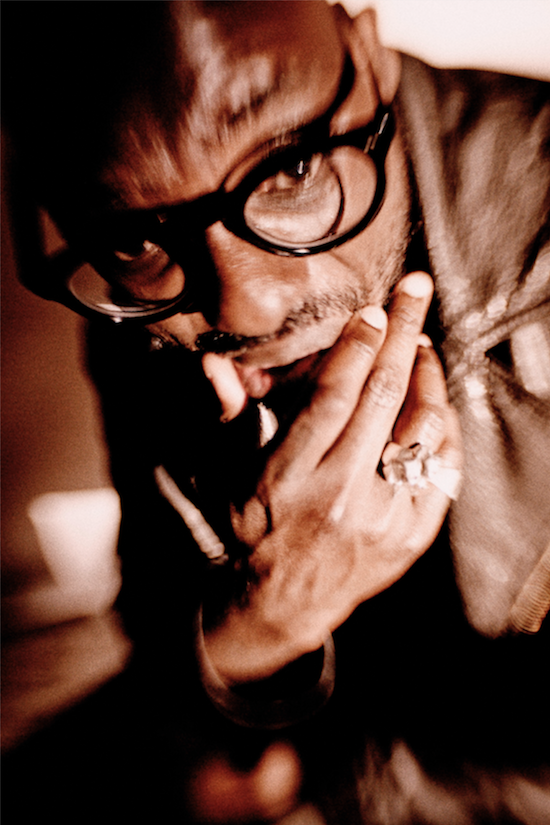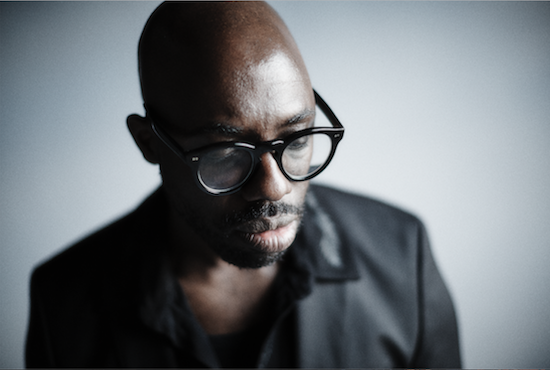A couple of days before my interview with Ghostpoet, I’d started reading a book I’d picked up at my local library (yes, I still go to libraries) called The End Of Absence. Written by Canadian journalist Michael Harris, the book describes how the generation born before 1985 (which includes Ghostpoet and myself) will be the last to remember a world without the internet. Its central theme is the “strange suffering” experienced by “digital immigrants”, those of us subsumed in digital life, but increasingly uneasy about the pace at which the internet has come to dominate our lives.
Weirdly, when I get a chance to speak to Ghospoet – known to his pals as Obaro Ejimiwe – a large chunk of our conversation ends up revolving around precisely this topic. It’s kind of appropriate then that he calls me up over Skype from his phone, and that I can’t actually see his face. “I’m at an age where I remember ‘the old world’, where things were very different”, he tells me. “I find it increasingly confusing because I’m very much a person of the present. I embrace things like social media. But I long for the calmness of the old world.” This preoccupation with the benefits and shortcoming of the virtual world has got him contemplating “ditching the smartphone”, and wondering what the future holds for future generations raised entirely in a digital landscape.
A year on from the release of his fourth album, Dark Days & Canapés – which tapped into the feelings of dread, anxiety and confusion that have come to define the mood of Britain over the past few years – Ghostpoet seems to be in a philosophical mood. Still mulling over many of the same themes that shaped the album, he seems calm and reflective, bemused by the weirdness of the modern world (“it’s like a Hollywood blockbuster”), all of which might have something to do with moving away from London, the city of his birth. As we talk, we explore the thought processes that went into making the album, life in his new coastal home and the importance of looking after his mental health while doing battle with the music industry.
It’s now been seven years since the release of Ghostpoet’s debut LP, Peanut Butter Blues & Melancholy Jam. The record made an immediate impression due to his unique, growling spoken-word style and the accessibility of the lyrics, which dealt with the strife, farce and follies of everyday life. While his early work drew comparisons with trip-hop, he’s never been overly concerned with labels, and his more recent efforts have shifted away from electronic production towards a live-band set up. Dark Days & Canapés, for example, was made in collaboration with producer Leo Abrahams, who has worked with artists as diverse as Wild Beasts, Regina Spektor, Ibeyi and John Hopkins.
When we get at chance to talk, he’s just got off the air with an Estonian radio station and is reflecting on his move away from London to the Kent seaside town of Margate just over a year ago. “I just decided I needed a bit more space”, he says. “I’m born and bred in London but it felt a bit claustrophobic. It was the right time to try something different and reconnect with nature.”
He’s not been alone in making this move. Over the past few years, large numbers of artists, musicians and other creative folk have been leaving the capital, under pressure from astronomical living costs, and heading for a calmer, cheaper life by the sea. As a result, Margate is currently witnessing something of a renaissance (or the early stages of gentrification, depending on your point of view). Alongside this burgeoning creative scene, however, Thanet, the district in which the town sits, is home to some of the highest levels of deprivation in Southeast England. It’s a fate which has befallen many British seaside towns whose economies rely heavily on seasonal tourism.
Ghostpoet is conscious of these contradictions. “It’s the same everywhere, isn’t it?” he says of his new home. “There is a disparity between the haves and the have-nots”. In Margate, this is magnified “because it’s a much smaller place then London or Manchester, or any city you want to name”. He feels optimistic that the influx of creative types will be have positive effects, however: “I hope that it benefits the local community as much as possible. There are people that have lived there all their lives and it’s important that they get a chance to take advantage of the increase in popularity”.
To this end, Ghostpoet has already been busy working on a new project. Rather than focusing on writing music since his arrival, he and his partner decided to set up a “bar/coffee shop/radio station” called Radio Margate. Part funded through Kickstarter, it’s a DIY affair and he went about learning the technical aspects of radio production by delving into the hive-mind of Youtube tutorials. “It’s an online station. We open Friday, Saturday and Sunday as a cafe-bar and whilst we’re open we have shows throughout the day and evening”, he explains. “I’ve been doing it for about six months. It’s still developing. It’s been really good so far”.

The sea air and mellower vibes of the Kent coastline seem to have put Ghostpoet into an expansive frame of mind and he comes across as warm and welcoming in our conversation.
Dark Days & Canapés, by contrast, was notable for its sense of claustrophobia, creeping dread, bewilderment, even outrage at the state of the world. Tracks such as ‘Freakshow’, ‘Immigrant Boogie’ and ‘Karoshi’ deal with topics such as the omnipotence of social media, the refugee crisis and global conflict respectively. I ask him whether he thinks descriptions of the album as his bleakest yet, as some have described it, are fair. “It’s an opinion. Do I agree with it? I was quite surprised personally.” he says. “I didn’t think it was bleak at all. It’s always different when you’re in the album-making process and people hear the end result of it. It was the most fun album to make”. He notes how he felt more confident this time round in the process, helped by the creative synergy he experienced with Leo Abrahams.
He says that the album was “much more concentrated than my previous records” in terms of “the immediacy of the lyrics. I wanted to hit people quickly, rather than massaging their minds into a false sense of security. I wanted to reach for the jugular”. In 2016, before the album came out, the UK was still reeling from the Brexit referendum, which had been won off the back of a campaign of overt xenophobia. During one particularly nasty episode, even pro-Brexit members of the Conservative party ended up condemning Nigel Farage’s now infamous Breaking Point poster, which depicted lines of Middle Eastern refugees apparently trying to storm the UK’s borders. Few musicians took this subject matter on in any substantial form. Two notable exceptions were M.I.A (in her track ‘Borders’) and Ghostpoet himself. ‘Immigrant Boogie’ was told from the point of view of a family huddled on a boat and trying to reach the safety of Europe. It features the lines “the boat’s going down and I don’t think we want to stay”.
When I ask him why he was drawn to this issue, it turns out there was a lot on his mind. In particular, “the general disregard for humans by other humans. The kind of existence where people are more interested in being online than in real life.” The thousands of refugees attempting to reach Europe, particularly those fleeing the devastation in Syria, were impossible to ignore: “It was something that was very prominent in the news and in conversation with family and friends. The images that were coming out were harrowing. It was something that I felt I needed to write about”. Rather than coming from a premeditated desire to make a darker album, the subject came about due to his creative process: “I soak up as much as possible, all types of experiences, news and conversations. When it’s time to write a record, it’s like throwing paint at a page. I just allow the music to dictate what will manifest.”
Ghostpoet stresses that he has no interest in being shoehorned into the role of political spokesperson. “I don’t class myself as a political artist at all. At best, I would say I’m a social commentator. I think it’s important to speak your truth, to try and put across how you feel about the world”. Nor does he seem himself as part of a lineage of socially-conscious poets or musicians. For him, the main impetus seems to be not to add to the already sizeable pile of “fast-food music” that provides “no nourishment” to the listener .
Far from the cliche of the tortured artist, burrowing himself away from the world in order to oust the demons from this soul, Ghostpoet, comes across as refreshingly grounded. He says that a sense of “inner peace” as much as feelings of “frustration at the way this world seems to be going” were guiding emotions during the making of the album. Part of what keeps him in a positive frame of mind is balancing his creative output with the other aspects of his life, “trying to live a life that isn’t immersed in music”, as he puts it. “I think if I spent every hour of the day obsessively making music or discussing it, it would be tougher for me, mentally. I just dip in and out when the urge comes”. He also ensures that he always has other projects on the go. Alongside his interest in radio, he’s a keen photographer: “It’s a serious hobby of mine”, he says, “another creative avenue that hopefully inspires something that I can use musically.”
The importance of looking after his own mental health is something he understands well, as someone trying to make a living in the music industry. I mention a statistic I’d read that came out of a study done by the University of Westminster, that 70% of professional musicians in the UK have reported experiencing anxiety or depression. As he sees it, there are clear reasons for this. “The music industry is not easy to be in. Sales are decreasing by the month. And it’s tough to take when you make a record, you’ve put blood, sweat and tears into a project, and nobody wants to buy it. It’s like a carpenter spending a year on a piece of furniture and being told: ‘I’ll give you a tenner for that’”. Live shows aren’t always as lucrative as they could be either: “It’s tough to get as many gigs as you need to be able to live from this game”, he says.
He also feels that it’s very important for musicians to be willing to continually develop. “You’ve got to evolve as an artist. If you don’t evolve, what’s the point? I think I’ve definitely evolved since the first record and I want to keep doing that. I don’t want to ever get to a stage where I’m like ‘I’m here now, I can rest easy’. It’s a constant pursuit of uncomfortable scenarios.” He remains aloof as to what precise direction his next project will take. But as one of the Britain’s most unique musical voices, it’ll no doubt still be worthy of our attention.
Ghostpoet plays Pop-Kultur Berlin on Friday night



